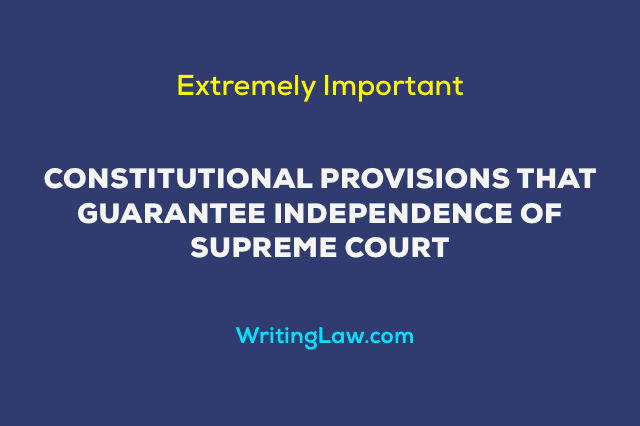
The Supreme Court is the highest court of appeal, the guarantor of fundamental rights, and the guardian of the Indian Constitution. It becomes essential for Supreme Court to maintain its independence to deliver its judgement without fear or favour. To ensure the independence of the Supreme Court, it should be free from encroachments, pressure and interference of the executive or legislature.
In short, it is important for the Indian Supreme Court to maintain its independence. These ten provisions in the Constitution of India ensure the freedom and impartiality of the Supreme Court. Let us have a look.
10 Reasons Why Indian Supreme Court Is Independent
These are the ten reasons why the Indian Supreme Court is free and independent:
- Mode of Judges Appointment Free From Political Considerations
- Security of Tenure
- Fixed Service Conditions
- Expenses Charged on Consolidated Fund
- Conduct of Judges Cannot Be Discussed
- Ban on Practice After Retirement
- Power to Punish for Its Contempt
- Freedom to Appoint Its Staff
- Jurisdiction Cannot Be Curtailed
- Separation From Executive
1. Mode of Judges Appointment Free From Political Considerations
Judges of the Supreme Court are appointed by the President by warrant under his/her hand and seal after consultation with judges of the Supreme Court and the High Courts. The provision ensures that the judicial appointments are not based on political or practical considerations.
2. Security of Tenure
The Constitution ensures the security of tenure of the Supreme Court judges as the judges can be removed from the office only in the manner provided and on the grounds mentioned in the Constitution by the President. They do not hold office at the President’s pleasure even though they are appointed by the President.
3. Fixed Service Conditions
The salaries, allowances, and pensions of the Supreme Court judges are determined from time to time by the Parliament. They cannot be changed to the disadvantage after the appointment of the judges (except during the financial emergency). Such service conditions cannot be altered during the term of office.
4. Expenses Charged on Consolidated Fund
The salaries, allowances, and pensions of the Supreme Court judges and the staff are charged on the consolidated fund of India. The administrative expenses of the Supreme Court are also charged on the consolidated fund of India.
5. Conduct of Judges Cannot Be Discussed
The conduct of judges cannot be discussed at the Parliament or in the State Legislatures regarding the discharge of their duties. Such conduct can be discussed when the impeachment motion is in action against the judge.
6. Ban on Practice After Retirement
The Supreme Court judges are not allowed to practice in any court or before any authority in the territory of India after retirement. This ensures that such judges do not favour anyone in the hope of future favour. However, they can be appointed to various posts in tribunals and commissions after their retirement, such as NHRC, NGT etc.
7. Power to Punish for Its Contempt
The Supreme Court has the power to punish any person for its contempt under Article 129 of the Constitution. The power is to ensure the authority, dignity and honour of the Supreme Court. The actions and decisions of the Supreme Court cannot be criticised or opposed by anybody.
8. Freedom to Appoint Its Staff
The Chief Justice of India has the power to appoint the officers and servants of the Supreme Court without any interference of the executive.
9. Jurisdiction Cannot Be Curtailed
The Parliament cannot curtail the jurisdiction and the power of the Supreme Court. Rather it can only be extended by the Parliament.
10. Separation From Executive
The Criminal Procedure Code has affected the separation of the judiciary from the executive. Article 50 under the Directive Principles of State Policy provides that the State shall take steps to separate the judiciary from the executive in the State’s public services.
Read Next: About the Supreme Court of India – Collegium, Powers, Judges and More
- What Is a Foreign Judgement and When It’s Not Binding in India - 26th July 2022
- What Are Second Appeals Under Civil Law - 23rd June 2022
- Civil Appeal as Per the Civil Procedure Code - 12th June 2022







